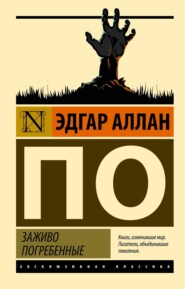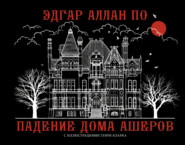По всем вопросам обращайтесь на: info@litportal.ru
(©) 2003-2025.
✖
The Works of Edgar Allan Poe — Volume 2
Настройки чтения
Размер шрифта
Высота строк
Поля
“And the motto?”
“Nemo me impune lacessit.”
“Good!” he said.
The wine sparkled in his eyes and the bells jingled. My own fancy grew warm with the Medoc. We had passed through walls of piled bones, with casks and puncheons intermingling, into the inmost recesses of the catacombs. I paused again, and this time I made bold to seize Fortunato by an arm above the elbow.
“The nitre!” I said: “see, it increases. It hangs like moss upon the vaults. We are below the river’s bed. The drops of moisture trickle among the bones. Come, we will go back ere it is too late. Your cough — ”
“It is nothing,” he said; “let us go on. But first, another draught of the Medoc.”
I broke and reached him a flagon of De Grâve. He emptied it at a breath. His eyes flashed with a fierce light. He laughed and threw the bottle upwards with a gesticulation I did not understand.
I looked at him in surprise. He repeated the movement — a grotesque one.
“You do not comprehend?” he said.
“Not I,” I replied.
“Then you are not of the brotherhood.”
“How?”
“You are not of the masons.”
“Yes, yes,” I said, “yes, yes.”
“You? Impossible! A mason?”
“A mason,” I replied.
“A sign,” he said.
“It is this,” I answered, producing a trowel from beneath the folds of my roquelaire.
“You jest,” he exclaimed, recoiling a few paces. “But let us proceed to the Amontillado.”
“Be it so,” I said, replacing the tool beneath the cloak, and again offering him my arm. He leaned upon it heavily. We continued our route in search of the Amontillado. We passed through a range of low arches, descended, passed on, and descending again, arrived at a deep crypt, in which the foulness of the air caused our flambeaux rather to glow than flame.
At the most remote end of the crypt there appeared another less spacious. Its walls had been lined with human remains, piled to the vault overhead, in the fashion of the great catacombs of Paris. Three sides of this interior crypt were still ornamented in this manner. From the fourth the bones had been thrown down, and lay promiscuously upon the earth, forming at one point a mound of some size. Within the wall thus exposed by the displacing of the bones, we perceived a still interior recess, in depth about four feet, in width three, in height six or seven. It seemed to have been constructed for no especial use in itself, but formed merely the interval between two of the colossal supports of the roof of the catacombs, and was backed by one of their circumscribing walls of solid granite.
It was in vain that Fortunato, uplifting his dull torch, endeavored to pry into the depths of the recess. Its termination the feeble light did not enable us to see.
“Proceed,” I said; “herein is the Amontillado. As for Luchesi — ”
“He is an ignoramus,” interrupted my friend, as he stepped unsteadily forward, while I followed immediately at his heels. In an instant he had reached the extremity of the niche, and finding his progress arrested by the rock, stood stupidly bewildered. A moment more and I had fettered him to the granite. In its surface were two iron staples, distant from each other about two feet, horizontally. From one of these depended a short chain, from the other a padlock. Throwing the links about his waist, it was but the work of a few seconds to secure it. He was too much astounded to resist. Withdrawing the key I stepped back from the recess.
“Pass your hand,” I said, “over the wall; you cannot help feeling the nitre. Indeed it is very damp. Once more let me implore you to return. No? Then I must positively leave you. But I must first render you all the little attentions in my power.”
“The Amontillado!” ejaculated my friend, not yet recovered from his astonishment.
“True,” I replied; “the Amontillado.”
As I said these words I busied myself among the pile of bones of which I have before spoken. Throwing them aside, I soon uncovered a quantity of building stone and mortar. With these materials and with the aid of my trowel, I began vigorously to wall up the entrance of the niche.
I had scarcely laid the first tier of my masonry when I discovered that the intoxication of Fortunato had in a great measure worn off. The earliest indication I had of this was a low moaning cry from the depth of the recess. It was not the cry of a drunken man. There was then a long and obstinate silence. I laid the second tier, and the third, and the fourth; and then I heard the furious vibrations of the chain. The noise lasted for several minutes, during which, that I might hearken to it with the more satisfaction, I ceased my labors and sat down upon the bones. When at last the clanking subsided, I resumed the trowel, and finished without interruption the fifth, the sixth, and the seventh tier. The wall was now nearly upon a level with my breast. I again paused, and holding the flambeaux over the mason-work, threw a few feeble rays upon the figure within.
A succession of loud and shrill screams, bursting suddenly from the throat of the chained form, seemed to thrust me violently back. For a brief moment I hesitated — I trembled. Unsheathing my rapier, I began to grope with it about the recess: but the thought of an instant reassured me. I placed my hand upon the solid fabric of the catacombs, and felt satisfied. I reapproached the wall. I replied to the yells of him who clamored. I re-echoed — I aided — I surpassed them in volume and in strength. I did this, and the clamorer grew still.
It was now midnight, and my task was drawing to a close. I had completed the eighth, the ninth, and the tenth tier. I had finished a portion of the last and the eleventh; there remained but a single stone to be fitted and plastered in. I struggled with its weight; I placed it partially in its destined position. But now there came from out the niche a low laugh that erected the hairs upon my head. It was succeeded by a sad voice, which I had difficulty in recognising as that of the noble Fortunato. The voice said —
“Ha! ha! ha! — he! he! — a very good joke indeed — an excellent jest. We will have many a rich laugh about it at the palazzo — he! he! he! — over our wine — he! he! he!”
“The Amontillado!” I said.
“He! he! he! — he! he! he! — yes, the Amontillado. But is it not getting late? Will not they be awaiting us at the palazzo, the Lady Fortunato and the rest? Let us be gone.”
“Yes,” I said, “let us be gone.”
“For the love of God, Montressor!”
“Yes,” I said, “for the love of God!”
But to these words I hearkened in vain for a reply. I grew impatient. I called aloud —
“Fortunato!”
No answer. I called again —
“Fortunato!”
No answer still. I thrust a torch through the remaining aperture and let it fall within. There came forth in return only a jingling of the bells. My heart grew sick — on account of the dampness of the catacombs. I hastened to make an end of my labor. I forced the last stone into its position; I plastered it up. Against the new masonry I re-erected the old rampart of bones. For the half of a century no mortal has disturbed them. In pace requiescat!
THE IMP OF THE PERVERSE
IN THE consideration of the faculties and impulses — of the prima mobilia of the human soul, the phrenologists have failed to make room for a propensity which, although obviously existing as a radical, primitive, irreducible sentiment, has been equally overlooked by all the moralists who have preceded them. In the pure arrogance of the reason, we have all overlooked it. We have suffered its existence to escape our senses, solely through want of belief — of faith; — whether it be faith in Revelation, or faith in the Kabbala. The idea of it has never occurred to us, simply because of its supererogation. We saw no need of the impulse — for the propensity. We could not perceive its necessity. We could not understand, that is to say, we could not have understood, had the notion of this primum mobile ever obtruded itself; — we could not have understood in what manner it might be made to further the objects of humanity, either temporal or eternal. It cannot be denied that phrenology and, in great measure, all metaphysicianism have been concocted a priori. The intellectual or logical man, rather than the understanding or observant man, set himself to imagine designs — to dictate purposes to God. Having thus fathomed, to his satisfaction, the intentions of Jehovah, out of these intentions he built his innumerable systems of mind. In the matter of phrenology, for example, we first determined, naturally enough, that it was the design of the Deity that man should eat. We then assigned to man an organ of alimentiveness, and this organ is the scourge with which the Deity compels man, will-I nill-I, into eating. Secondly, having settled it to be God’s will that man should continue his species, we discovered an organ of amativeness, forthwith. And so with combativeness, with ideality, with causality, with constructiveness, — so, in short, with every organ, whether representing a propensity, a moral sentiment, or a faculty of the pure intellect. And in these arrangements of the Principia of human action, the Spurzheimites, whether right or wrong, in part, or upon the whole, have but followed, in principle, the footsteps of their predecessors: deducing and establishing every thing from the preconceived destiny of man, and upon the ground of the objects of his Creator.
It would have been wiser, it would have been safer, to classify (if classify we must) upon the basis of what man usually or occasionally did, and was always occasionally doing, rather than upon the basis of what we took it for granted the Deity intended him to do. If we cannot comprehend God in his visible works, how then in his inconceivable thoughts, that call the works into being? If we cannot understand him in his objective creatures, how then in his substantive moods and phases of creation?
Induction, a posteriori, would have brought phrenology to admit, as an innate and primitive principle of human action, a paradoxical something, which we may call perverseness, for want of a more characteristic term. In the sense I intend, it is, in fact, a mobile without motive, a motive not motivirt. Through its promptings we act without comprehensible object; or, if this shall be understood as a contradiction in terms, we may so far modify the proposition as to say, that through its promptings we act, for the reason that we should not. In theory, no reason can be more unreasonable, but, in fact, there is none more strong. With certain minds, under certain conditions, it becomes absolutely irresistible. I am not more certain that I breathe, than that the assurance of the wrong or error of any action is often the one unconquerable force which impels us, and alone impels us to its prosecution. Nor will this overwhelming tendency to do wrong for the wrong’s sake, admit of analysis, or resolution into ulterior elements. It is a radical, a primitive impulse-elementary. It will be said, I am aware, that when we persist in acts because we feel we should not persist in them, our conduct is but a modification of that which ordinarily springs from the combativeness of phrenology. But a glance will show the fallacy of this idea. The phrenological combativeness has for its essence, the necessity of self-defence. It is our safeguard against injury. Its principle regards our well-being; and thus the desire to be well is excited simultaneously with its development. It follows, that the desire to be well must be excited simultaneously with any principle which shall be merely a modification of combativeness, but in the case of that something which I term perverseness, the desire to be well is not only not aroused, but a strongly antagonistical sentiment exists.
An appeal to one’s own heart is, after all, the best reply to the sophistry just noticed. No one who trustingly consults and thoroughly questions his own soul, will be disposed to deny the entire radicalness of the propensity in question. It is not more incomprehensible than distinctive. There lives no man who at some period has not been tormented, for example, by an earnest desire to tantalize a listener by circumlocution. The speaker is aware that he displeases; he has every intention to please, he is usually curt, precise, and clear, the most laconic and luminous language is struggling for utterance upon his tongue, it is only with difficulty that he restrains himself from giving it flow; he dreads and deprecates the anger of him whom he addresses; yet, the thought strikes him, that by certain involutions and parentheses this anger may be engendered. That single thought is enough. The impulse increases to a wish, the wish to a desire, the desire to an uncontrollable longing, and the longing (to the deep regret and mortification of the speaker, and in defiance of all consequences) is indulged.
We have a task before us which must be speedily performed. We know that it will be ruinous to make delay. The most important crisis of our life calls, trumpet-tongued, for immediate energy and action. We glow, we are consumed with eagerness to commence the work, with the anticipation of whose glorious result our whole souls are on fire. It must, it shall be undertaken to-day, and yet we put it off until to-morrow, and why? There is no answer, except that we feel perverse, using the word with no comprehension of the principle. To-morrow arrives, and with it a more impatient anxiety to do our duty, but with this very increase of anxiety arrives, also, a nameless, a positively fearful, because unfathomable, craving for delay. This craving gathers strength as the moments fly. The last hour for action is at hand. We tremble with the violence of the conflict within us, — of the definite with the indefinite — of the substance with the shadow. But, if the contest have proceeded thus far, it is the shadow which prevails, — we struggle in vain. The clock strikes, and is the knell of our welfare. At the same time, it is the chanticleer — note to the ghost that has so long overawed us. It flies — it disappears — we are free. The old energy returns. We will labor now. Alas, it is too late!
We stand upon the brink of a precipice. We peer into the abyss — we grow sick and dizzy. Our first impulse is to shrink from the danger. Unaccountably we remain. By slow degrees our sickness and dizziness and horror become merged in a cloud of unnamable feeling. By gradations, still more imperceptible, this cloud assumes shape, as did the vapor from the bottle out of which arose the genius in the Arabian Nights. But out of this our cloud upon the precipice’s edge, there grows into palpability, a shape, far more terrible than any genius or any demon of a tale, and yet it is but a thought, although a fearful one, and one which chills the very marrow of our bones with the fierceness of the delight of its horror. It is merely the idea of what would be our sensations during the sweeping precipitancy of a fall from such a height. And this fall — this rushing annihilation — for the very reason that it involves that one most ghastly and loathsome of all the most ghastly and loathsome images of death and suffering which have ever presented themselves to our imagination — for this very cause do we now the most vividly desire it. And because our reason violently deters us from the brink, therefore do we the most impetuously approach it. There is no passion in nature so demoniacally impatient, as that of him who, shuddering upon the edge of a precipice, thus meditates a Plunge. To indulge, for a moment, in any attempt at thought, is to be inevitably lost; for reflection but urges us to forbear, and therefore it is, I say, that we cannot. If there be no friendly arm to check us, or if we fail in a sudden effort to prostrate ourselves backward from the abyss, we plunge, and are destroyed.
Examine these similar actions as we will, we shall find them resulting solely from the spirit of the Perverse. We perpetrate them because we feel that we should not. Beyond or behind this there is no intelligible principle; and we might, indeed, deem this perverseness a direct instigation of the Arch-Fiend, were it not occasionally known to operate in furtherance of good.
“Nemo me impune lacessit.”
“Good!” he said.
The wine sparkled in his eyes and the bells jingled. My own fancy grew warm with the Medoc. We had passed through walls of piled bones, with casks and puncheons intermingling, into the inmost recesses of the catacombs. I paused again, and this time I made bold to seize Fortunato by an arm above the elbow.
“The nitre!” I said: “see, it increases. It hangs like moss upon the vaults. We are below the river’s bed. The drops of moisture trickle among the bones. Come, we will go back ere it is too late. Your cough — ”
“It is nothing,” he said; “let us go on. But first, another draught of the Medoc.”
I broke and reached him a flagon of De Grâve. He emptied it at a breath. His eyes flashed with a fierce light. He laughed and threw the bottle upwards with a gesticulation I did not understand.
I looked at him in surprise. He repeated the movement — a grotesque one.
“You do not comprehend?” he said.
“Not I,” I replied.
“Then you are not of the brotherhood.”
“How?”
“You are not of the masons.”
“Yes, yes,” I said, “yes, yes.”
“You? Impossible! A mason?”
“A mason,” I replied.
“A sign,” he said.
“It is this,” I answered, producing a trowel from beneath the folds of my roquelaire.
“You jest,” he exclaimed, recoiling a few paces. “But let us proceed to the Amontillado.”
“Be it so,” I said, replacing the tool beneath the cloak, and again offering him my arm. He leaned upon it heavily. We continued our route in search of the Amontillado. We passed through a range of low arches, descended, passed on, and descending again, arrived at a deep crypt, in which the foulness of the air caused our flambeaux rather to glow than flame.
At the most remote end of the crypt there appeared another less spacious. Its walls had been lined with human remains, piled to the vault overhead, in the fashion of the great catacombs of Paris. Three sides of this interior crypt were still ornamented in this manner. From the fourth the bones had been thrown down, and lay promiscuously upon the earth, forming at one point a mound of some size. Within the wall thus exposed by the displacing of the bones, we perceived a still interior recess, in depth about four feet, in width three, in height six or seven. It seemed to have been constructed for no especial use in itself, but formed merely the interval between two of the colossal supports of the roof of the catacombs, and was backed by one of their circumscribing walls of solid granite.
It was in vain that Fortunato, uplifting his dull torch, endeavored to pry into the depths of the recess. Its termination the feeble light did not enable us to see.
“Proceed,” I said; “herein is the Amontillado. As for Luchesi — ”
“He is an ignoramus,” interrupted my friend, as he stepped unsteadily forward, while I followed immediately at his heels. In an instant he had reached the extremity of the niche, and finding his progress arrested by the rock, stood stupidly bewildered. A moment more and I had fettered him to the granite. In its surface were two iron staples, distant from each other about two feet, horizontally. From one of these depended a short chain, from the other a padlock. Throwing the links about his waist, it was but the work of a few seconds to secure it. He was too much astounded to resist. Withdrawing the key I stepped back from the recess.
“Pass your hand,” I said, “over the wall; you cannot help feeling the nitre. Indeed it is very damp. Once more let me implore you to return. No? Then I must positively leave you. But I must first render you all the little attentions in my power.”
“The Amontillado!” ejaculated my friend, not yet recovered from his astonishment.
“True,” I replied; “the Amontillado.”
As I said these words I busied myself among the pile of bones of which I have before spoken. Throwing them aside, I soon uncovered a quantity of building stone and mortar. With these materials and with the aid of my trowel, I began vigorously to wall up the entrance of the niche.
I had scarcely laid the first tier of my masonry when I discovered that the intoxication of Fortunato had in a great measure worn off. The earliest indication I had of this was a low moaning cry from the depth of the recess. It was not the cry of a drunken man. There was then a long and obstinate silence. I laid the second tier, and the third, and the fourth; and then I heard the furious vibrations of the chain. The noise lasted for several minutes, during which, that I might hearken to it with the more satisfaction, I ceased my labors and sat down upon the bones. When at last the clanking subsided, I resumed the trowel, and finished without interruption the fifth, the sixth, and the seventh tier. The wall was now nearly upon a level with my breast. I again paused, and holding the flambeaux over the mason-work, threw a few feeble rays upon the figure within.
A succession of loud and shrill screams, bursting suddenly from the throat of the chained form, seemed to thrust me violently back. For a brief moment I hesitated — I trembled. Unsheathing my rapier, I began to grope with it about the recess: but the thought of an instant reassured me. I placed my hand upon the solid fabric of the catacombs, and felt satisfied. I reapproached the wall. I replied to the yells of him who clamored. I re-echoed — I aided — I surpassed them in volume and in strength. I did this, and the clamorer grew still.
It was now midnight, and my task was drawing to a close. I had completed the eighth, the ninth, and the tenth tier. I had finished a portion of the last and the eleventh; there remained but a single stone to be fitted and plastered in. I struggled with its weight; I placed it partially in its destined position. But now there came from out the niche a low laugh that erected the hairs upon my head. It was succeeded by a sad voice, which I had difficulty in recognising as that of the noble Fortunato. The voice said —
“Ha! ha! ha! — he! he! — a very good joke indeed — an excellent jest. We will have many a rich laugh about it at the palazzo — he! he! he! — over our wine — he! he! he!”
“The Amontillado!” I said.
“He! he! he! — he! he! he! — yes, the Amontillado. But is it not getting late? Will not they be awaiting us at the palazzo, the Lady Fortunato and the rest? Let us be gone.”
“Yes,” I said, “let us be gone.”
“For the love of God, Montressor!”
“Yes,” I said, “for the love of God!”
But to these words I hearkened in vain for a reply. I grew impatient. I called aloud —
“Fortunato!”
No answer. I called again —
“Fortunato!”
No answer still. I thrust a torch through the remaining aperture and let it fall within. There came forth in return only a jingling of the bells. My heart grew sick — on account of the dampness of the catacombs. I hastened to make an end of my labor. I forced the last stone into its position; I plastered it up. Against the new masonry I re-erected the old rampart of bones. For the half of a century no mortal has disturbed them. In pace requiescat!
THE IMP OF THE PERVERSE
IN THE consideration of the faculties and impulses — of the prima mobilia of the human soul, the phrenologists have failed to make room for a propensity which, although obviously existing as a radical, primitive, irreducible sentiment, has been equally overlooked by all the moralists who have preceded them. In the pure arrogance of the reason, we have all overlooked it. We have suffered its existence to escape our senses, solely through want of belief — of faith; — whether it be faith in Revelation, or faith in the Kabbala. The idea of it has never occurred to us, simply because of its supererogation. We saw no need of the impulse — for the propensity. We could not perceive its necessity. We could not understand, that is to say, we could not have understood, had the notion of this primum mobile ever obtruded itself; — we could not have understood in what manner it might be made to further the objects of humanity, either temporal or eternal. It cannot be denied that phrenology and, in great measure, all metaphysicianism have been concocted a priori. The intellectual or logical man, rather than the understanding or observant man, set himself to imagine designs — to dictate purposes to God. Having thus fathomed, to his satisfaction, the intentions of Jehovah, out of these intentions he built his innumerable systems of mind. In the matter of phrenology, for example, we first determined, naturally enough, that it was the design of the Deity that man should eat. We then assigned to man an organ of alimentiveness, and this organ is the scourge with which the Deity compels man, will-I nill-I, into eating. Secondly, having settled it to be God’s will that man should continue his species, we discovered an organ of amativeness, forthwith. And so with combativeness, with ideality, with causality, with constructiveness, — so, in short, with every organ, whether representing a propensity, a moral sentiment, or a faculty of the pure intellect. And in these arrangements of the Principia of human action, the Spurzheimites, whether right or wrong, in part, or upon the whole, have but followed, in principle, the footsteps of their predecessors: deducing and establishing every thing from the preconceived destiny of man, and upon the ground of the objects of his Creator.
It would have been wiser, it would have been safer, to classify (if classify we must) upon the basis of what man usually or occasionally did, and was always occasionally doing, rather than upon the basis of what we took it for granted the Deity intended him to do. If we cannot comprehend God in his visible works, how then in his inconceivable thoughts, that call the works into being? If we cannot understand him in his objective creatures, how then in his substantive moods and phases of creation?
Induction, a posteriori, would have brought phrenology to admit, as an innate and primitive principle of human action, a paradoxical something, which we may call perverseness, for want of a more characteristic term. In the sense I intend, it is, in fact, a mobile without motive, a motive not motivirt. Through its promptings we act without comprehensible object; or, if this shall be understood as a contradiction in terms, we may so far modify the proposition as to say, that through its promptings we act, for the reason that we should not. In theory, no reason can be more unreasonable, but, in fact, there is none more strong. With certain minds, under certain conditions, it becomes absolutely irresistible. I am not more certain that I breathe, than that the assurance of the wrong or error of any action is often the one unconquerable force which impels us, and alone impels us to its prosecution. Nor will this overwhelming tendency to do wrong for the wrong’s sake, admit of analysis, or resolution into ulterior elements. It is a radical, a primitive impulse-elementary. It will be said, I am aware, that when we persist in acts because we feel we should not persist in them, our conduct is but a modification of that which ordinarily springs from the combativeness of phrenology. But a glance will show the fallacy of this idea. The phrenological combativeness has for its essence, the necessity of self-defence. It is our safeguard against injury. Its principle regards our well-being; and thus the desire to be well is excited simultaneously with its development. It follows, that the desire to be well must be excited simultaneously with any principle which shall be merely a modification of combativeness, but in the case of that something which I term perverseness, the desire to be well is not only not aroused, but a strongly antagonistical sentiment exists.
An appeal to one’s own heart is, after all, the best reply to the sophistry just noticed. No one who trustingly consults and thoroughly questions his own soul, will be disposed to deny the entire radicalness of the propensity in question. It is not more incomprehensible than distinctive. There lives no man who at some period has not been tormented, for example, by an earnest desire to tantalize a listener by circumlocution. The speaker is aware that he displeases; he has every intention to please, he is usually curt, precise, and clear, the most laconic and luminous language is struggling for utterance upon his tongue, it is only with difficulty that he restrains himself from giving it flow; he dreads and deprecates the anger of him whom he addresses; yet, the thought strikes him, that by certain involutions and parentheses this anger may be engendered. That single thought is enough. The impulse increases to a wish, the wish to a desire, the desire to an uncontrollable longing, and the longing (to the deep regret and mortification of the speaker, and in defiance of all consequences) is indulged.
We have a task before us which must be speedily performed. We know that it will be ruinous to make delay. The most important crisis of our life calls, trumpet-tongued, for immediate energy and action. We glow, we are consumed with eagerness to commence the work, with the anticipation of whose glorious result our whole souls are on fire. It must, it shall be undertaken to-day, and yet we put it off until to-morrow, and why? There is no answer, except that we feel perverse, using the word with no comprehension of the principle. To-morrow arrives, and with it a more impatient anxiety to do our duty, but with this very increase of anxiety arrives, also, a nameless, a positively fearful, because unfathomable, craving for delay. This craving gathers strength as the moments fly. The last hour for action is at hand. We tremble with the violence of the conflict within us, — of the definite with the indefinite — of the substance with the shadow. But, if the contest have proceeded thus far, it is the shadow which prevails, — we struggle in vain. The clock strikes, and is the knell of our welfare. At the same time, it is the chanticleer — note to the ghost that has so long overawed us. It flies — it disappears — we are free. The old energy returns. We will labor now. Alas, it is too late!
We stand upon the brink of a precipice. We peer into the abyss — we grow sick and dizzy. Our first impulse is to shrink from the danger. Unaccountably we remain. By slow degrees our sickness and dizziness and horror become merged in a cloud of unnamable feeling. By gradations, still more imperceptible, this cloud assumes shape, as did the vapor from the bottle out of which arose the genius in the Arabian Nights. But out of this our cloud upon the precipice’s edge, there grows into palpability, a shape, far more terrible than any genius or any demon of a tale, and yet it is but a thought, although a fearful one, and one which chills the very marrow of our bones with the fierceness of the delight of its horror. It is merely the idea of what would be our sensations during the sweeping precipitancy of a fall from such a height. And this fall — this rushing annihilation — for the very reason that it involves that one most ghastly and loathsome of all the most ghastly and loathsome images of death and suffering which have ever presented themselves to our imagination — for this very cause do we now the most vividly desire it. And because our reason violently deters us from the brink, therefore do we the most impetuously approach it. There is no passion in nature so demoniacally impatient, as that of him who, shuddering upon the edge of a precipice, thus meditates a Plunge. To indulge, for a moment, in any attempt at thought, is to be inevitably lost; for reflection but urges us to forbear, and therefore it is, I say, that we cannot. If there be no friendly arm to check us, or if we fail in a sudden effort to prostrate ourselves backward from the abyss, we plunge, and are destroyed.
Examine these similar actions as we will, we shall find them resulting solely from the spirit of the Perverse. We perpetrate them because we feel that we should not. Beyond or behind this there is no intelligible principle; and we might, indeed, deem this perverseness a direct instigation of the Arch-Fiend, were it not occasionally known to operate in furtherance of good.

















